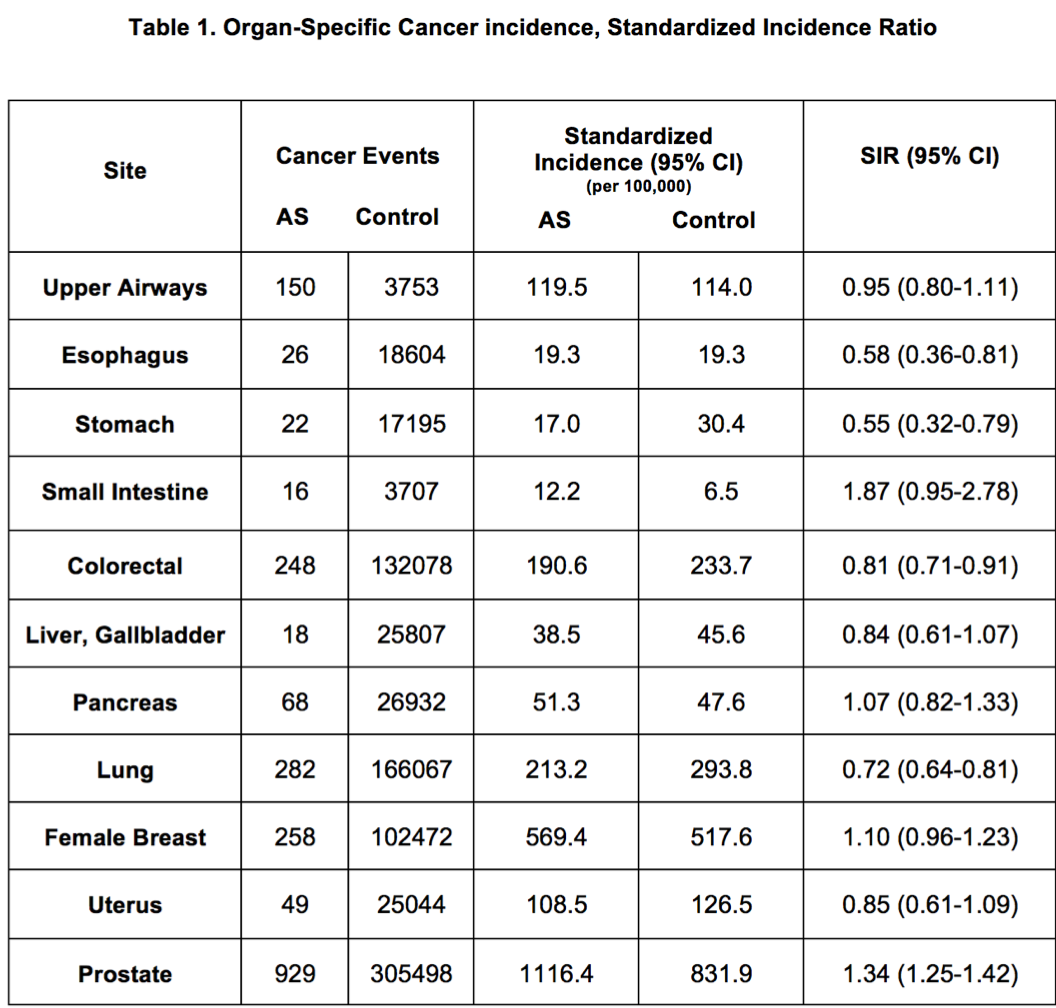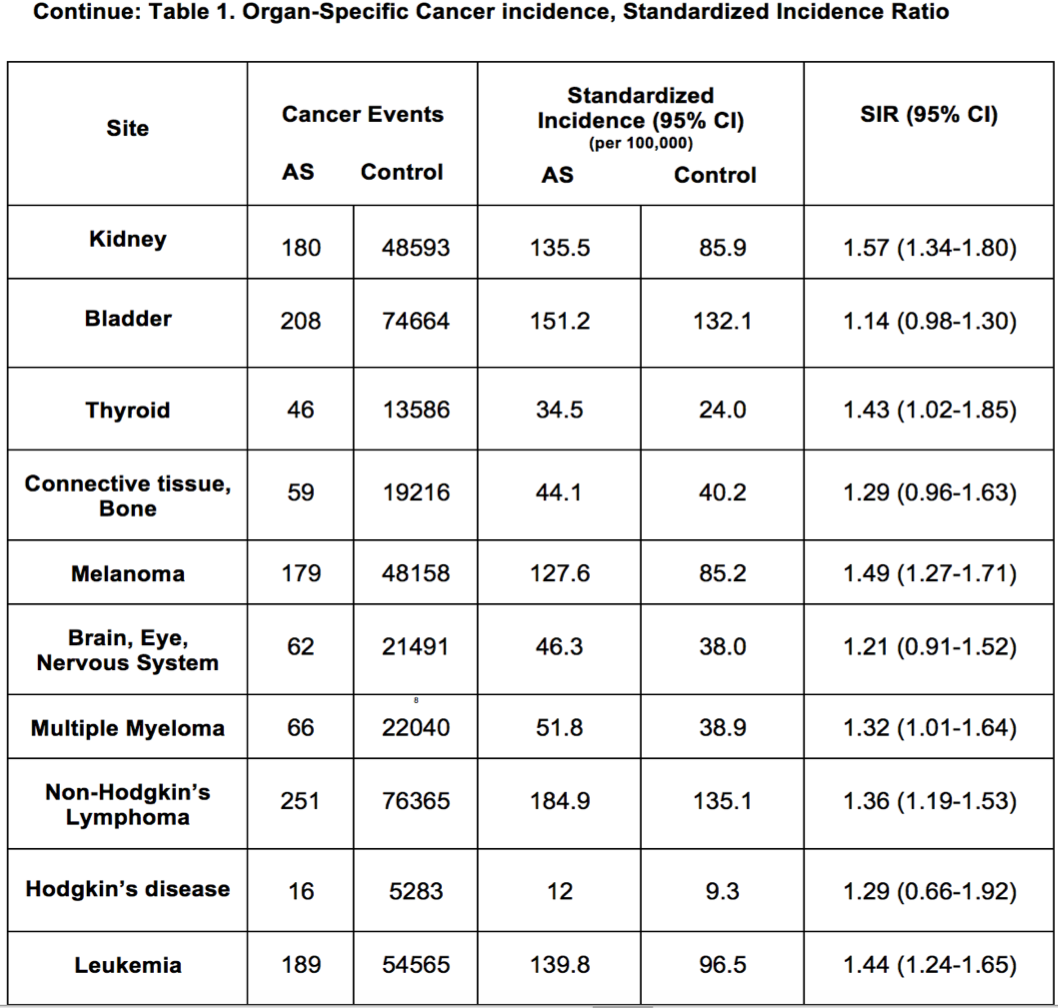Session Information
Date: Sunday, October 21, 2018
Title: 3S088 ACR Abstract: Spondyloarthritis Incl PsA–Clinical I: Axial SpA Epidemiology (892–897)
Session Type: ACR Concurrent Abstract Session
Session Time: 2:30PM-4:00PM
Background/Purpose:
Few studies have examined risk of cancer in ankylosing spondylitis (AS) since the end of the radiation therapy era. With greater use of biologics, establishing the baseline risk has become more important. The objective of this study was to assess the risk of organ specific cancer in a population-based sample of elderly patients with AS.
Methods:
We reviewed Medicare databases from 1999 to 2013 for all beneficiaries 65 or older with a diagnosis of AS, excluding those with concomitant diagnosis of other rheumatic diseases. The reference population was a 30% stratified random sample of beneficiaries without a diagnosis of AS, matched on age and sex. New cancer diagnoses were identified in the AS and reference population when there were two identical International Classification of Disease-9 codes in visits at least thirty days apart. Those who developed cancer within the first year of observation were excluded. Patients were followed until 2015. Standardized incidence ratio (SIR) was defined as the ratio of observed to expected number of cancers in AS compared to the reference group, accounting for person-years at risk.
Results:
A total of 13,305 AS (66% male, 91% white, median follow up 10 years) and 6,749,053 beneficiaries without AS (66% male, 85% white, median follow up 8 years) were included. AS patients contributed 130,841 person-years and beneficiaries without AS contributed 56,515,489 person-years of follow up.
A total of 3322 cancers occurred in AS and 1,211,126 cancers occurred in beneficiaries without AS.
SIR (95% confidence interval) for six sites were higher in AS: kidney cancer 1.57 (1.34-1.80) melanoma 1.49 (1.27-1.71) thyroid cancer 1.43 (1.02-1.85) leukemia 1.44 (1.24-1.65) non-Hodgkin’s lymphoma 1.36 (1.19-1.53) and prostate cancer 1.34 (1.25-1.42).
SIR for four sites were lower in AS: esophagus 0.58 (0.36-0.81) stomach 0.55 (0.32-0.79) colorectal 0.81 (0.71-0.91) and lung cancer 0.72 (0.64-0.81). (table 1)
Conclusion:
Elderly patients with AS are at increased risk of hematological malignancies and kidney cancer but have lower risk of gastrointestinal and lung cancer. The relative protection from gastrointestinal and lung cancer and increased risk of kidney cancer is consistent with the pattern seen with chronic use of nonsteroidal anti-inflammatory drugs.
Further study is required to distinguish disease from treatment related cancer risk in AS.
To cite this abstract in AMA style:
Alehashemi S, Ward M. Cancer Risk in Ankylosing Spondylitis in United States Medicare Beneficiaries: Detection of a Chronic Non Steroidal Anti-Inflammatory Drug Use Signature [abstract]. Arthritis Rheumatol. 2018; 70 (suppl 9). https://acrabstracts.org/abstract/cancer-risk-in-ankylosing-spondylitis-in-united-states-medicare-beneficiaries-detection-of-a-chronic-non-steroidal-anti-inflammatory-drug-use-signature/. Accessed .« Back to 2018 ACR/ARHP Annual Meeting
ACR Meeting Abstracts - https://acrabstracts.org/abstract/cancer-risk-in-ankylosing-spondylitis-in-united-states-medicare-beneficiaries-detection-of-a-chronic-non-steroidal-anti-inflammatory-drug-use-signature/


